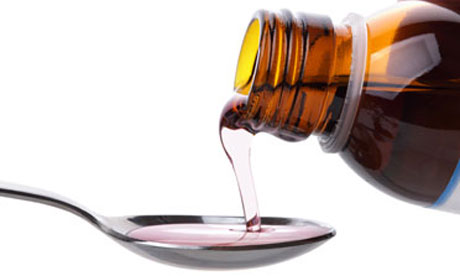
Most people get coughs when they have caught a cold. It is nature's way of protecting our airways, a reflex response to any irritation in our throat. But because coughs are so annoying, especially when we're hacking away at night, we'd rather get rid of them, hence our love of syrupy cough medicines. But do they actually work or are we just wasting our money?
The solution
A cough can linger for up to two weeks, because the upper airways are inflamed by the cold virus and mucus trickling down the back of the throat. Cough syrups either try to suppress it or help you to cough up phlegm. Cough suppressants contain pholcodeine or dextromethorphan, which tell the brain to stop the coughing reflex. They can make you dizzy and sleepy, which is fine if you are staying in bed, but not so good if you are driving. Expectorants that help to bring up phlegm contain ipecacuanha or guaifenesin but they can make you feel sick, drowsy and give you a headache.
Some cough medicines contain antihistamines, which aim to dampen down the allergy-type symptoms of a cold, by stopping your eyes and nose from running. However they can also make you sleepy, hallucinate and give you palpitations. Even if you're happy to risk these side effects, there is no guarantee that cough syrups will stop you from coughing (although they might do so by making you fall asleep). Research says there is no clear evidence they either work or don't work.
In 2009, the Commission on Human Medicines (CHM) said that coughs and cold syrups with these types of ingredients should not be given to children under the age of six, because the risks outweigh any benefits. While it sounds like a good idea to give children with raging coughs and colds a medicine that makes them tired, sometimes it makes them too sleepy. Syrups containing codeine are best avoided in children as they essentially sedate you, and children vary in how quickly they metabolise the drug. In adults these syrups are less risky, but there is still no evidence that they work. A review of available research by the Cochrane Acute Respiratory Infections Group, said that the studies done so far were small, often of poor quality and gave conflicting results.
What should you take?
A 2007 study by the Pennsylvania State University, suggested that a dose of honey at night was better than cough syrups (however the study was funded by the honey industry). What it really showed was that honey was better than no treatment at all, in reducing how often the observed children coughed (not how severe the cough was). But since honey tastes good, slips down a treat with hot water and lemon, and won't harm you (although it shouldn't be given to babies under one because of a rare risk of infant botulism), I'd say that it is safer than cough syrups. Combine it with paracetamol to relieve the pain.
Evidence from the Cochrane Database of Systematic Reviews on the effectiveness of echinacea, vitamin C or zinc to treat coughs and colds concludes that they don't stop you coughing or make your cold better.
Not all coughs are due to viral infections. If a cough lasts for longer than two weeks or is accompanied by other symptoms, such as a fever or coughing up blood, or in a child sounds like barking, see a doctor.

